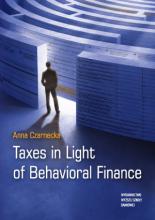Taxes in Light of Behavioral Finance
Taxes in Light of Behavioral Finance. Experimental Study is a publication of the author's PhD dissertation which was defended at the Faculty of Economics and Management of the University of Szczecin in 2016. The book presents the theory of tax, including various tax definitions, characteristics of the elements of the tax structure, tax principles, tax functions and attitudes towards taxation. It also contains a historical outline of behavioral finance and the prospect theory together with the description of framing effect and fiscal illusions by J. Buchanan. The book summarizes the most important studies on taxes, including behavioral finance, and gives a thorough description of the conducted experimental research into the attitudes towards the elements of the tax structure. It is the very first study of that type regarding the Polish tax system.
The following book is an attempt of combining public finance and behavioral finance together with the elements of experimental economics. It will enable the reader to view taxation from a different perspective and find answers to the following questions: Why are we, on one hand, in favor of pro-family tax reliefs and, on the other hand, against higher taxation for childless people? Do we really opt for progressive taxation or are we simply subject to some illusions?
The following publication can be used by lecturers, researchers, students and those who would like to take a closer look at taxes and the tax system from a completely different angle.


